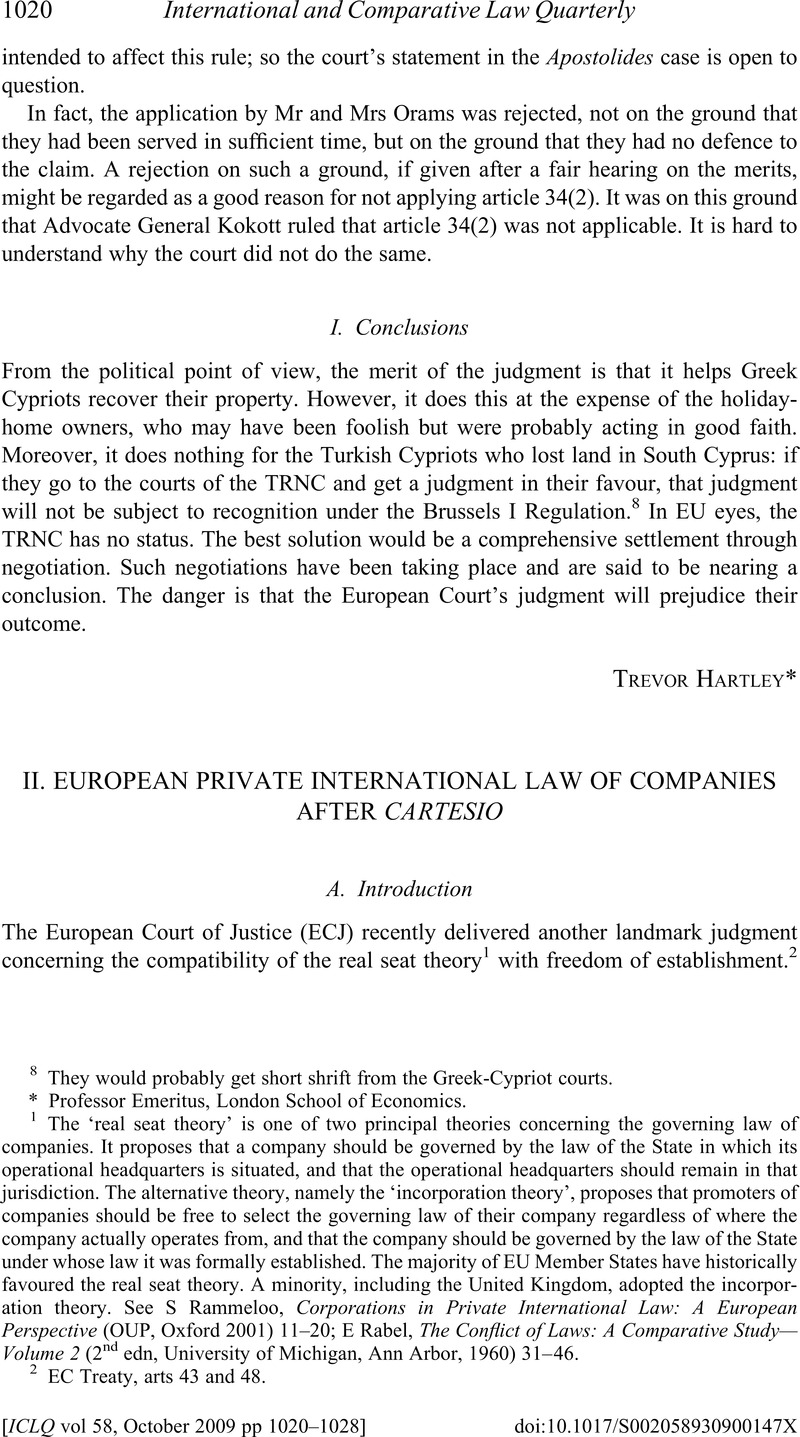Article contents
II. EUROPEAN PRIVATE INTERNATIONAL LAW OF COMPANIES AFTER CARTESIO
Published online by Cambridge University Press: 21 October 2009
Abstract

- Type
- Current Developments: Private International Law
- Information
- Copyright
- Copyright © 2009 British Institute of International and Comparative Law
References
1 The ‘real seat theory’ is one of two principal theories concerning the governing law of companies. It proposes that a company should be governed by the law of the State in which its operational headquarters is situated, and that the operational headquarters should remain in that jurisdiction. The alternative theory, namely the ‘incorporation theory’, proposes that promoters of companies should be free to select the governing law of their company regardless of where the company actually operates from, and that the company should be governed by the law of the State under whose law it was formally established. The majority of EU Member States have historically favoured the real seat theory. A minority, including the United Kingdom, adopted the incorporation theory. See S Rammeloo, Corporations in Private International Law: A European Perspective (OUP, Oxford 2001) 11–20; E Rabel, The Conflict of Laws: A Comparative Study—Volume 2 (2nd edn, University of Michigan, Ann Arbor, 1960) 31–46.
2 EC Treaty, arts 43 and 48.
3 Case C-210/06 Cartesio Oktató és Szolgáltató bt [2008] WLR (D) 400.
4 EC Treaty, art 48.
5 EC Treaty, art 293.
6 The attempt of the original Member States to adopt the EC Convention on the Mutual Recognition of Companies and Bodies Corporate suggests that in the judgment of the Community's founders an agreement of that sort was necessary; it was agreement, rather than necessity that was wanting.
7 See for example E Micheler, ‘Recognition of Companies Incorporated in other EU Member States’ (2003) ICLQ 521–534; WF Ebke, ‘The European Conflict-of-Corporate-Laws Revolution: Uberseering, Inspire Art and Beyond’ [2004] International Lawyer 813–853; WG Ringe, ‘No Freedom of Emigration for Companies?’ (2005) European Business Law Review 621–642; B Angelette, ‘The Revolution that Never Came and the Revolution Coming—De Lasteyrie du Salliant, Marks & Spencer, Sevic Systems and the Changing Corporate Law in Europe’ (2006) Virginia Law Review 1189–1223.
8 Case 81/87 The Queen v HM Treasury and Commissioners of Inland Revenue, ex parte Daily Mail and General Trust plc [1988] ECR 5483.
9 ibid paras 23–25.
10 Case C-212/97 Centros Ltd v Erhvervs- og Selskabsstyrelsen [1999] ECR I-01459.
11 Case C-208/00 Überseering v Nordic Construction Company Baumanagement GmbH (NCC) [2002] ECR I-9919.
12 Case C-167/01 Kamer van Koophandel en Fabrieken voor Amsterdam v Inspire Art Ltd [2003] ECR I-10155.
13 Pseudo-foreign corporations are companies that operate principally in one State but that are established under the laws of another State: ‘The prototype of the pseudo-foreign corporation can well be the local hotel owned entirely by local residents but incorporated out of state’. ER Latty, ‘Pseudo-Foreign Corporations’ [1955] Yale Law Journal 137.
14 Case C-208/00 Überseering v Nordic Construction Company Baumanagement GmbH (NCC) [2002] ECR I-9919, para 62.
15 Case C-411/03 Sevic Systems AG [2005] ECR I-10805.
16 At the time of the litigation in Sevic Systems there was no secondary European legislation that governed cross-border mergers as the Cross-Border Merger Directive (Directive 2005/56/EC of the European Parliament and of the Council of 26 October 2005 on cross-border mergers of limited liability companies [2005] OJ L310/1) was still to be finally approved by the Community's institutions.
17 AG Maduro in Case C-210/06 Cartesio Oktató és Szolgáltató bt [2008] WLR (D) 400, para 28.
18 ibid para 25.
19 Case C-212/97 Centros Ltd v Erhvervs- og Selskabsstyrelsen [1999] ECR I-01459, Paragraph 20.
20 Case C-210/06 Cartesio Oktató és Szolgáltató bt [2008] WLR (D) 400, paras 106–109.
21 Case 81/87 The Queen v HM Treasury and Commissioners of Inland Revenue, ex parte Daily Mail and General Trust plc [1988] ECR 5483, para 21.
22 Case C-210/06 Cartesio Oktató és Szolgáltató bt [2008] WLR (D) 400, para 106.
23 ibid paras 21–23; Case C-210/06 Cartesio Oktató és Szolgáltató bt [2008] WLR (D) 400, para 109.
24 See AG Colomer in Case C-208/00 Überseering BV v Nordic Construction Company Baumanagement GmbH (NCC) [2002] ECR I-9919, paras 35–40,
25 Case C-208/00 Überseering v Nordic Construction Company Baumanagement GmbH (NCC) [2002] ECR I-9919, para 54.
26 ibid.
27 See Case C-210/06 Cartesio Oktató és Szolgáltató bt [2008] WLR (D) 400, paras 121–123.
28 Save for limited exceptions, the ‘internal affairs doctrine’ provides that a company must be governed by only one law, namely the law of the State in which it is formally incorporated. See Restatement (Second) of Conflict of Laws § 302; C Kersting, ‘Corporate Choice of Law—A Comparison of The United States and European Systems and a Proposal for a European Directive’ (2002) 1 Brooklyn Journal of International Law, 3–6.
29 ibid para 122.
30 See AG Maduro in Case C-210/06 Cartesio Oktató és Szolgáltató bt [2008] WLR (D) 400, para 25.
31 Case C-411/03 Sevic Systems AG [2005] ECR I-10805, paras 20–31.
32 ibid paras 20–23.
33 See AG Maduro in Case C-210/06 Cartesio Oktató és Szolgáltató bt [2008] WLR (D) 400, para 25.
34 Case C-210/06 Cartesio Oktató és Szolgáltató bt [2008] WLR (D) 400 paras 111–112.
35 ibid para 112.
36 See Rabel (n 1) 31.
37 C McCreevy, ‘Speech 07/441: Company Law and Corporate Governance Today’ (2007) <http://europa.eu/rapid/pressReleasesAction.do?reference=SPEECH/07/441&format=DOC&aged=1&language=EN&guiLanguage=en >accessed 26 May 2009.
38 See AG Maduro in Case C-210/06 Cartesio Oktató és Szolgáltató bt [2008] WLR (D) 400, para 31.
39 See CWA Timmermans, ‘Company Law as Ius Commune?’ (2002) Walter van Gerven Lecture, Leuven Centre for a Common Law of Europe <http://www.law.kuleuven.ac.be/ccle/pdf/wvg1.pdf>accessed 25 May 2009, 2–4.
40 See WF Ebke, ‘The “Real Seat” Doctrine in the Conflict of Laws’ (2002) The International Lawyer 1015, 1027–1029.
41 ibid.
42 Commission (EC), ‘an area of freedom, security and justice servicing the citizen’ (Communication) COM (09) 262 final, 14.
- 3
- Cited by




